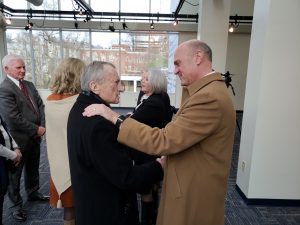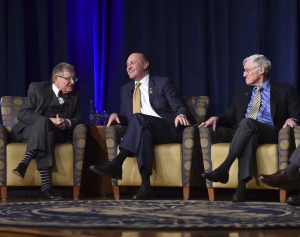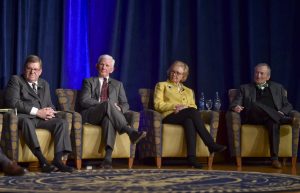MORGANTOWN — Seven West Virginia University presidents, spanning the years 1977 to today, gathered on a single stage Thursday to share their thoughts on higher education and WVU’s place in West Virginia and in their hearts.

“This is awesome, look at this lineup,” said Jim Clements, who served 2009-2013, during a press meeting prior to the main event.
They were there for the WVU Festival of Ideas Presidents Panel Discussion: The Future of Higher Education. On hand were Gene Budig, 1977-1989; Diane Reinhard, acting president 1985-1986; Neil Bucklew, 1986-1995; David Hardesty, 1995-2007; Peter Magrath, interim president 2008-2009; Clements; and Gordon Gee, 1981-1985 and 2014 to the present.

Mike Garrison, 2007-2008, had a prior commitment and couldn’t attend.
Counting their time at the helms of other universities, their experience spans 125 years with 15 systems in 13 states. Hardesty originated the Festival of Ideas when he was a WVU student and made it a university program during his tenure.
“I always love these guys, they’re wonderful,” said Budig. With his characteristic sharp humor, he added, “What was really neat was we all liked each other. We would occasionally disagree when these guys didn’t see the light initially, but they came along. They’re all reasonably bright.”

Professor Emeritus Robert DiClerico moderated the panel discussion held in the Mountainlair. He opened by asking if higher education in general suffers a public relations problem, given a recent Pew Research poll showing only 40 percent of those surveyed felt they got their money’s worth from their education.
Clements said that during his youth, people were told education is a path to a better life. “There’s a change. We don’t value education the way we used to value education.” So higher education leaders need to do a better job getting the message out.”
On the other hand, Magrath asked, “Why do people keep coming to us and wanting to attend our colleges and our universities if we’re worthless and aren’t important? I think the answer speaks for itself.”
Bucklew observed that student debt plays a role in decisions about college attendance. States are diverting limited resources to other matters while tuition outpaces inflation.
I think that influences how we’re observed.”
Reinhard also cited the high cost of higher ed. Legislators look at the expense in an economic development light. Students look at the bottom line. “Why should I pay for the whole album when I only want two songs?”
Hardesty pointed to WVU’s land grant mission and its presence in every county via 4H and extension. If people were asked if they benefited from those things or saw a WVU doctor, the survey results might be different, he said.
The presidents also addressed the mission of WVU as a land grant institution. DiClerico said some perceive WVU as spending too little energy on teaching and too much on research.
Clements said presidents are pulled different ways and it takes a balance. “Students are always first.” Research comes second. Third is community service through 4H, extension and such. “You’re always pulled in multiple directions and it’s hard to find that right balance.”
Budig said, “We’re in show business, come on. You guys know it and I know it. … We’ll continue to be driven by money. I’m sorry, that is the way it is.”
On the topic of declining state funding, Hardesty said legislatures are looking at other demands – prisons, the opioid crisis, healthcare – and seeing that universities can raise their own money, and raise tuition. “We have to somehow match our expenses with our income.” That requires employing business principals and close monitoring by the president.
While universities are trimming majors that appear to have no practical value, McGrath said, the arts and sciences are in fact the most practical discipline. That’s where students learn how to think, grow and adapt to change.
Gee said WVU needs to focus on its core mission: teaching and learning. WVU isn’t in the restaurant business or the parking business; so if someone else can do it better, let them and focus on the mission – an idea that may not be popular.
That led to a discussion on athletics.
Magrath said that if he were still in charge, he would say, “I’ve had it with big-time intercollegiate athletics. The tail is wagging the dog.” Do away with it and concentrate on education, with club sports.
Clements now leads Clemson, ranked second behind Alabama in the college football rankings. “It’s an important part of who a university is,” he said. “It brings people together.” And it’s a vehicle for a president to do fundraising for academics. “The point is, it has to know its place within the university.”
Asked what stood out about WVU and West Virginia during their tenures, they shared similar sentiments.
“I think that it’s the commitment to the state that makes this university really stand out,” Reinhard said.
Hardesty said he’s been associated with WVU for 55 years. The faculty cares about the students, he said and West Virginians care about WVU. “I think it’s in the nature of the state, a state in which people care about one another.”
Gee said many of the nation’s 4,500 colleges and universities are trying to do good things but many are focused on prestige. WVU has a different purpose.
“Every day when I wake up I know I have a reason for doing what I’m doing and I know I‘m going to make a difference in the lives of someone,” and everybody at WVU believes that. “If you want to climb the prestige ladder, this is not the place. If you want to have real purpose in your life and you want to accomplish great things, then this is where you should be.”




